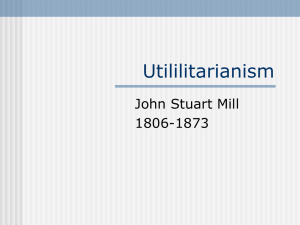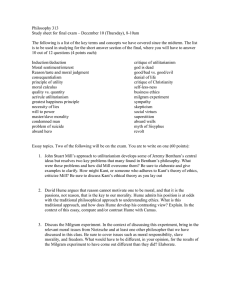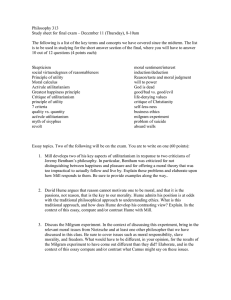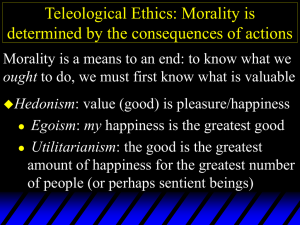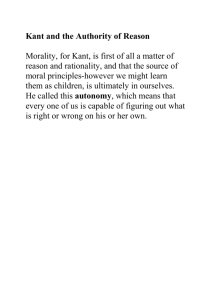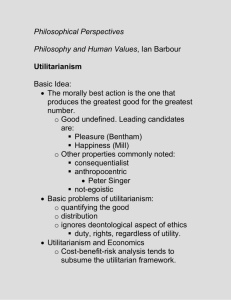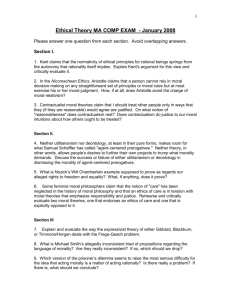FREE Sample Here
advertisement
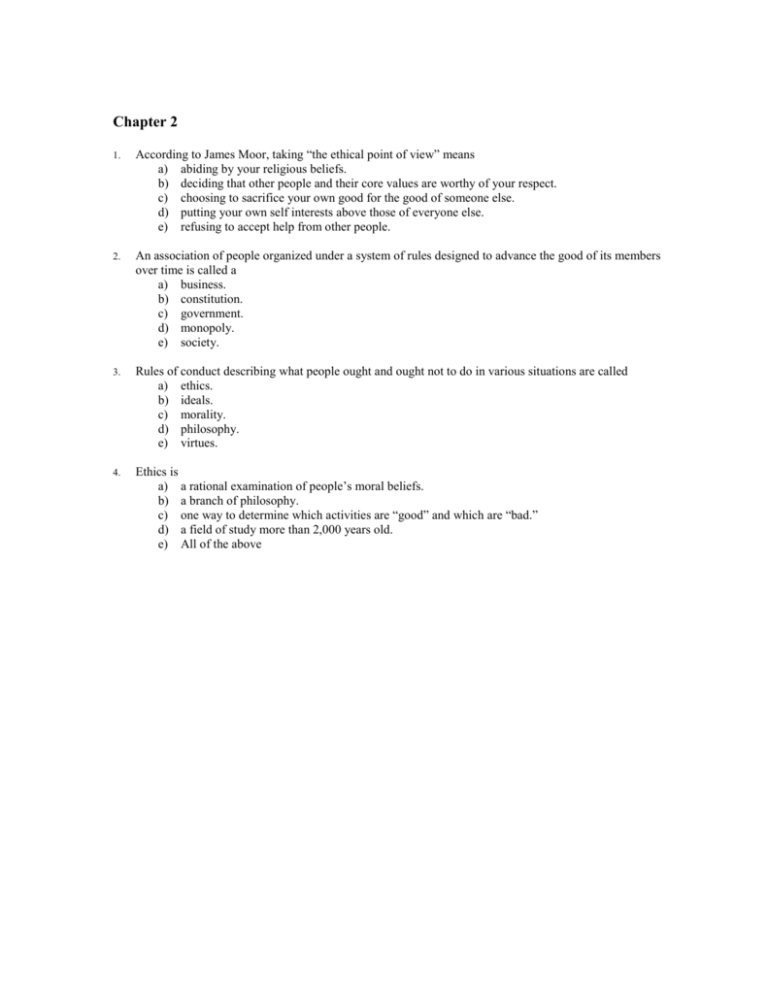
Chapter 2 1. According to James Moor, taking “the ethical point of view” means a) abiding by your religious beliefs. b) deciding that other people and their core values are worthy of your respect. c) choosing to sacrifice your own good for the good of someone else. d) putting your own self interests above those of everyone else. e) refusing to accept help from other people. 2. An association of people organized under a system of rules designed to advance the good of its members over time is called a a) business. b) constitution. c) government. d) monopoly. e) society. 3. Rules of conduct describing what people ought and ought not to do in various situations are called a) ethics. b) ideals. c) morality. d) philosophy. e) virtues. 4. Ethics is a) a rational examination of people’s moral beliefs. b) a branch of philosophy. c) one way to determine which activities are “good” and which are “bad.” d) a field of study more than 2,000 years old. e) All of the above 5. A relativist claims that a) there are no universal moral principles. b) morality has an existence outside the human mind. c) morality and law are identical. d) there is no such thing as free will. e) God does not exist. 6. Objectivism is based on the idea that a) there are no universal moral principles. b) morality has an existence outside the human mind. c) morality and law are identical. d) there is no such thing as free will. e) God does not exist. 7. The divine command theory is an example of a) relativism. b) objectivism. c) egoism. d) existentialism. e) materialism. 8. Which of the following is an argument in favor of the divine command theory? a) The divine command theory is not based on reason. b) It is fallacious to equate “the good” with “God.” c) God is all-knowing. d) Some moral problems are not addressed directly in scripture. e) The Bible has contradictory moral teachings. 9. Ethical egoism is a) not based on reason or logic. b) based on determining long-term beneficial consequences. c) the divine command theory by another name. d) Kantianism by another name. e) utilitarianism by another name. 10. Which of the following is an argument in favor of ethical egoism? a) Ethical egoism is supported by verses in the Bible. b) People are naturally altruistic. c) The community can benefit when individuals put their well-being first. d) It is not true that people naturally act in their own long-term self-interest. e) Ethical egoism treats all persons as moral equals. 11. According to Kant, our sense of “ought to” is called a) necessity. b) insecurity. c) paranoia. d) love. e) dutifulness. 12. According to Kant, the moral value of an action depends upon a) its consequences. b) the underlying moral rule. c) how closely it aligns with Biblical teachings. d) how closely it aligns with the law. e) the extent to which it produces happiness. 13. According to the second formulation of the Categorical Imperative, a) the moral worth of a person depends upon that person’s actions. b) one good turn deserves another. c) bad deeds should be punished. d) it is wrong for one person to “use” another. e) the moral worth of a person depends upon that person’s intentions. 14. The Principle of Utility is also called a) the Categorical Imperative. b) the Difference Principle. c) the Greatest Happiness Principle. d) the Social Contract. e) the Ten Commandments. 15. Two philosophers closely associated with utilitarianism are a) Jeremy Bentham and John Stuart Mill. b) Immanuel Kant and Jeremy Bentham. c) Immanuel Kant and John Stuart Mill. d) John Stuart Mill and John Rawls. e) Jean-Jacques Rousseau and John Rawls. 16. Utilitarianism is an example of a) a practical implementation of the divine command theory. b) a non-consequentialist theory. c) a consequentialist theory. d) the social contract theory. e) a relativistic theory. 17. The problem of moral luck is raised as a criticism of a) the divine command theory. b) cultural relativism. c) act utilitarianism. d) rule utilitarianism. e) Kantianism. 18. Utilitarianism does not mean “the greatest good of the greatest number” because a) it is impossible to calculate “the greatest good.” b) it focuses solely on “the greatest good” and pays no attention to how “the good” is distributed. c) some people have no moral worth. d) it is impossible to maximize “the good” without ruining the environment. e) All of the above 19. Thomas Hobbes called life without rules and a means of enforcing them a) anarchy. b) communism. c) democracy. d) the state of nature. e) utopia. An early proponent of the social contract was a) Jeremy Bentham. b) John Stuart Mill. c) Jean-Jacque Rousseau. d) Karl Marx. e) John Brown. 21. A right that another can guarantee by leaving you alone to exercise the right is called a 20. a) b) c) d) e) positive right. negative right. absolute right. limited right. proverbial right. 22. A right that is guaranteed without exception is called a a) positive right. b) negative right. c) absolute right. d) limited right. e) proverbial right. 23. The idea that social and economic inequalities must be to the greatest benefit of the least-advantaged members of society is called a) capitalism. b) communism. c) socialism. d) utilitarianism. e) the difference principle.
